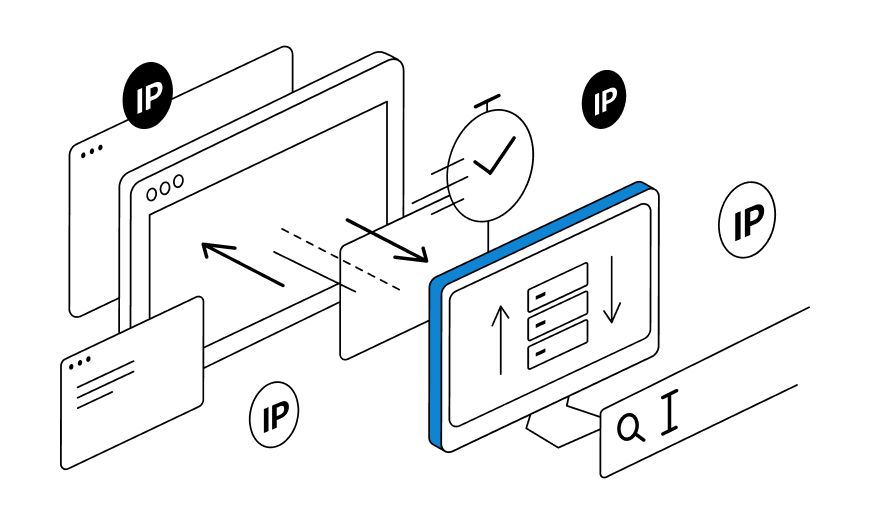There are numerous varieties and shapes of proxies available. We will examine every significant aspect of backconnect proxies in this article. These proxies come in handy for people or businesses who need to use web scraping tools, monitor rival websites, or get around internet restrictions. Let’s look at all of the details about backconnect proxies.
What is a Backconnect Proxy?
A backconnect proxy is basically a server that can allow you to change IPs for each request. This way, tracking your activity online will become way more difficult and time consuming. More than this, the backconnect option has a really extensive pool of available IPs, so it can be used for large-scale data harvesting and automation related tasks.
Backconnect proxies send your traffic to a set or pool of proxy server. Each of these servers has a unique IP address, so you can constantly jump from one address to another. Anyone who tries to backtrack your action will find it extremely hard because of the constantly changing parameters of your connection.
One of the main benefits of this proxy type lies in providing access to geo-restricted content. For example, you can use social networks or other sites that are banned in your region. And even if you face flagging or bans, you can switch your IP and continue browsing like before.
What is a Backconnect Proxy Used For?
Now that we understand the basics, we can discuss what the best use cases are for the backconnetc proxy type. Let’s see the most popular spheres where you can use these proxies.
First of all, a tool like this will be crucial for any large scale data harvesting project. With a backconnect proxy, you can scrape information from several sources at the same time without any trouble with performance. Constant use of new IP addresses for connections allows you to avoid any risks of being blocked or flagged in the process.
Back connect proxies can also help to improve online representation for businesses. The best results in SEO relates tasks and better positioning in search engine results can be achieved because of the multi users possibility. This way, you can collect data from different locations and boost your site’s view rates.
In the same manner, you can work on any marketing task. Special tools like marketers can use backconnect rotating proxy to verify ads and control ad placement across several sources at the same time.
Then, SMM work can also benefit from utilizing backconnect proxies. For example, you can automate some of the actions on social media, like posting, following, and commenting. IP rotation in this case also helps to avoid blocks and keep the rhythm of the work.
In some cases, backconnect residential proxy can also be used for purchasing limited run items online. With a wide range of IPs under your control, you can access shopping opportunities in the first line. Plus, with changing IPs, you will also be able to buy several items, even in the most limited collections.
What are the Types of Backconnect Proxies?
Another good thing about backconncet proxy is that almost any popular type of server can use this option for connection. So you can find a residential or datacenter proxy with a backconnect function attached to it.
This can happen because backconnection is based more on the server setup itself, than on the source of the IP address. For example, you can try to use datacenter rotating proxy and enjoy both a high level of security and a robust response time. Overall, depending on your specific tasks, proxies can remain static, like a static residential proxy, or constantly change IP, like a backconnect type.
How to Choose a Backconnect Proxy?
When you choose a backconnect proxy, you need to consider several main things. First of all, you need to look at the reputation and quality of the services the provider offers. Some of the providers give you an option for trial use, so it will be wise to test servers before finalizing your decision.
This also applies to the speed and response time of the proxy servers. You need to test the possible limits of the servers and check the stability of the connection. Then there is also a factor of the proxy pool sizes. You need to find a provider that can offer servers in all the locations you need. This can also affect the speed of your connection.
The last important point to consider is customer support and pricing options. With solid support, you can always be sure that any possible problems with your servers will be solved in a short period of time. And flexible pricing options can guarantee that you will find a server that fits your requests and budget at the same time.
Pros and Cons of a Backconnect Proxy
Now, let’s talk about all of the main benefits and disadvantages of backconnect proxies in different use cases and scenarios.
The first main advantage related to this type of proxy lies in the field of time consumption. With a backconnect server, almost any data harvesting project can utilize both the rotation and multiple request options to gain the best results. Both of these tricks allow you to save time because of parallel scraping from several sources, and protection from most of the possible blocks and flagging risks.
You can also rotate IPs and overcome any request and rate limits that sites have. Regularly, any web site has a limit for requests in a minute, after which your activity will be banned. With backconnect rotating proxy, you can automatically change your IP address every time this happens and send as many requests as you want to any site.
Overall, backconnect proxies is a great tool for increasing anonymity and your online security. With constantly changing IP addresses, it is not a trivial task to track or ban your activity. So, you can rest assured that your online activity will remain masked.
In the same way, with rotation, you can access almost any available site online. Even if access to some of the pages is restricted in your location, proxies can be an easy tool for avoiding any limitations in your browsing and accessing any needed content.
However, keep in mind that backconnect proxies also have a number of downsides. The first of them is the higher price point compared to a datacenter or residential proxy. All of the additional functionality, like rotation and wide pools of IPs, comes at a cost. So, in the end, backconnect proxies tend to be on the more expensive side.
The other downside is more specific. Backconnect proxies highly rely on the location of your initial connection. So, if your system or scraping server is located far from the backconnect one, you can experience reduced speeds and response times. Overall, it is best to choose a server according to your specific tasks at the moment.
Frequently Asked Questions
Please read our Documentation if you have questions that are not listed below.
-
What are backconnect proxies?
A backconnect proxy is represented by a server with a pool of IPs that can be used consequently for requesting access to your target site. Each session a new IP gets assigned to grant the access to complete your online operation be it web scraping or data harvesting. Backconnect proxies are often referred to as rotating proxies.
-
What are the most common use cases of backconnect proxies?
The most common use case for backconnect proxies is the web scraping of large marketplaces and web search engines. The IP rotating mechanism of backconnect proxies reduces the cases of triggering the captcha on such bot-sensitive sites.
-
What kind of task is the best for backconnect proxies?
If you are looking to start your scraping project, backconnect proxies can be a perfect tool for you.
-
What are the advantages of backconnect proxies?
The main benefits of backconnect proxies are a very low rate of detection by target sites (since a new IP is on every time the target is accessed), improved anonymity, and security - your risks of infiltration by any malicious software are reduced to zero.
-
How do backconnect proxies work?
Backconnect proxies work by constantly changing your IP address through a ready made pool of addresses. This way, your connection can be more stable and anonymous.
Top 5 posts

